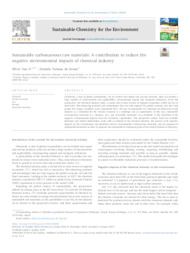Sustainable carbonaceous raw materials: a contribution to reduce the negative environmental impacts of chemical industry.
Sustainable carbonaceous raw materials: a contribution to reduce the negative environmental impacts of chemical industry.
Author(s): VAZ JUNIOR, S.; SOUZA, D. T. de
Summary: Chemicals, a class of global commodities, can be divided into inputs and end-use products, what can include a huge number of characteristics and applicability, encompassing organic and inorganic substances. From this perspective, the chemical industry plays a crucial role in most sectors of regional economies, which has led to innovative, life-enhancing products and technologies that not only support the global economy, but also help people live longer, healthier, more sustainable lives. The use of sustainable raw materials for feedstock of this industry as a transition for the circular economy is a challenge and an opportunity. In this way, sustainable carbonaceous materials (i.e., biomass, CO2, and recyclable materials) can contribute to the reduction of the negative environmental impacts from the chemistry exploitation. This perspective article, based-on scientific literature and market information, deals with an outlook of the chemical industry, the sources of its negative impacts on the environment, the industrial sources of sustainable carbonaceous materials, and the proposal of sustainable feedstocks in order to promote the sustainable development goals of the United Nations in chemistry.
Publication year: 2024
Types of publication: Journal article
Unit: Embrapa Agroenergy
Observation
Some of Embrapa's publications are published as ePub files. To read them, use or download one of the following free software options to your computer or mobile device. Android: Google Play Books; IOS: iBooks; Windows and Linux: Calibre.
Access other publications
Access the Agricultural Research Database (BDPA) to consult Embrapa's full library collection and records.
Visit Embrapa Bookstore to purchase books and other publications sold by Embrapa.

